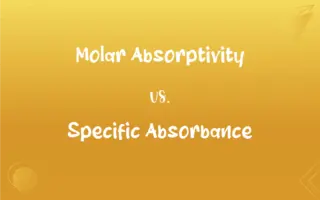Emulsion vs. Paint: What's the Difference?
Edited by Aimie Carlson || By Harlon Moss || Published on December 9, 2023
Emulsion is a water-based mixture of polymers used mainly for walls and ceilings, whereas paint is a broad term for liquid substances applied to surfaces for color or protection.

Key Differences
Emulsion, typically water-based, is used for its quick-drying and low odor properties. Paint, in contrast, can be either water-based or oil-based, offering a wider range of finishes and uses.
Emulsion paints are known for their durability and washability, making them ideal for interior walls and ceilings. Traditional paints vary in durability and are used on diverse surfaces, including wood and metal.
Emulsions often provide a matte or low sheen finish, preferred for hiding imperfections on walls. While, paints come in various finishes, from matte to high gloss, suitable for different aesthetic and functional needs.
The composition of emulsion is such that it allows for more breathability of surfaces, reducing moisture problems. Paints, especially oil-based ones, can be less breathable but offer stronger waterproofing.
Emulsion typically has lower VOC (Volatile Organic Compounds) levels, making it more environmentally friendly. Paints, depending on their base, can have higher VOC levels, requiring more ventilation during application.
ADVERTISEMENT
Comparison Chart
Base
Water-based.
Can be water-based or oil-based.
Finish
Often matte or low sheen.
Ranges from matte to high gloss.
Durability
Durable, washable, ideal for interiors.
Varies; some types more suited for exteriors.
Breathability
More breathable, reduces moisture issues.
Less breathable, especially oil-based paints.
Environmental Impact
Lower VOC levels, more eco-friendly.
Higher VOCs in some types, less eco-friendly.
ADVERTISEMENT
Emulsion and Paint Definitions
Emulsion
A colloidal suspension used in various industrial processes.
The emulsion in the reactor was critical for the chemical synthesis.
Paint
A colored substance applied to surfaces for decoration or protection.
They chose a bright blue paint for the nursery walls.
Emulsion
A fine dispersion of minute droplets of one liquid in another.
The emulsion of oil in vinegar is essential for a good vinaigrette.
Paint
A liquid mixture containing pigments for applying color.
The artist mixed her own paint to get the perfect shade.
Emulsion
A mixture of two liquids that usually don't mix, stabilized by an emulsifier.
In food science, mayonnaise is a common example of an emulsion.
Paint
A coating that dries to form a hard layer on a surface.
The paint on the old fence started to chip and peel.
Emulsion
A water-based paint with polymer micro-particles.
The emulsion dried quickly, leaving a smooth finish on the wall.
Paint
Any substance used for artistic or creative coloring.
He used acrylic paint for his abstract canvas art.
Emulsion
A photosensitive layer used in photographic films and papers.
The emulsion on the film captures the image when exposed to light.
Paint
A medium for artistic expression through color application.
Her talent with paint and brush was evident in her artwork.
Emulsion
A suspension of small globules of one liquid in a second liquid with which the first will not mix
An emulsion of oil in vinegar.
Paint
A liquid mixture, usually of a solid pigment in a liquid vehicle, used as a decorative or protective coating.
Emulsion
A photosensitive coating, usually of silver halide grains in a thin gelatin layer, on photographic film, paper, or glass.
Paint
The thin dry film formed by such a mixture when applied to a surface.
Emulsion
A stable suspension of small droplets of one liquid in another with which it is immiscible.
Mayonnaise is an emulsion where egg is used to keep oil and water mixed.
Emulsion
(chemistry) A colloid in which both phases are liquid.
Emulsion
(photography) The coating of photosensitive silver halide grains in a thin gelatine layer on a photographic film.
Emulsion
Any liquid preparation of a color and consistency resembling milk; as: (a) In pharmacy, an extract of seeds, or a mixture of oil and water united by a mucilaginous substance. (b) In photography, a liquid preparation of collodion holding salt of silver, used in the photographic process.
Emulsion
(chemistry) a colloid in which both phases are liquids;
An oil-in-water emulsion
Emulsion
A light-sensitive coating on paper or film; consists of fine grains of silver bromide suspended in a gelatin
FAQs
Is emulsion only used for walls?
Primarily, but it can also be used on ceilings and other suitable surfaces.
Can paint be used outdoors?
Yes, certain paints are formulated specifically for outdoor use.
Can oil-based paint be used over water-based paint?
Generally, it's not recommended without proper surface preparation.
Is emulsion environmentally friendly?
Emulsions typically have lower VOC levels, making them more eco-friendly.
How to dispose of leftover paint?
Check local regulations for proper disposal or recycling options.
Does emulsion paint need a primer?
It depends on the surface; some surfaces may require priming first.
How long does paint take to dry?
Drying times vary, with water-based paints usually drying faster than oil-based.
Can emulsion be used in bathrooms?
Yes, specially formulated emulsions are available for high moisture areas.
Is emulsion suitable for wood surfaces?
It's not ideal; wood surfaces usually require specific types of paint.
Does paint color fade over time?
Some paints, especially in direct sunlight, can fade over time.
Is emulsion waterproof?
Not entirely, but it is more resistant to moisture than some paints.
Can emulsion be used on metal surfaces?
Generally, no. Metal surfaces require specially formulated paints.
Can paint be applied over wallpaper?
It's possible, but the results and durability can vary.
Do all paints contain lead?
No, lead in paint has been largely phased out due to health concerns.
Is emulsion paint washable?
Yes, many emulsion paints are designed to be washable.
Does emulsion emit a strong odor?
Emulsion generally has a lower odor compared to some oil-based paints.
Can paint be used as a primer?
Some paints have primer included, but a separate primer is often recommended for best results.
Can you mix different paint types?
Mixing different types of paint is generally not advisable.
How many coats of emulsion are needed?
Typically, two coats are recommended for even coverage.
Can paint be used on plastic surfaces?
Some paints are formulated for plastic, but not all are suitable.
About Author
Written by
Harlon MossHarlon is a seasoned quality moderator and accomplished content writer for Difference Wiki. An alumnus of the prestigious University of California, he earned his degree in Computer Science. Leveraging his academic background, Harlon brings a meticulous and informed perspective to his work, ensuring content accuracy and excellence.
Edited by
Aimie CarlsonAimie Carlson, holding a master's degree in English literature, is a fervent English language enthusiast. She lends her writing talents to Difference Wiki, a prominent website that specializes in comparisons, offering readers insightful analyses that both captivate and inform.






































































